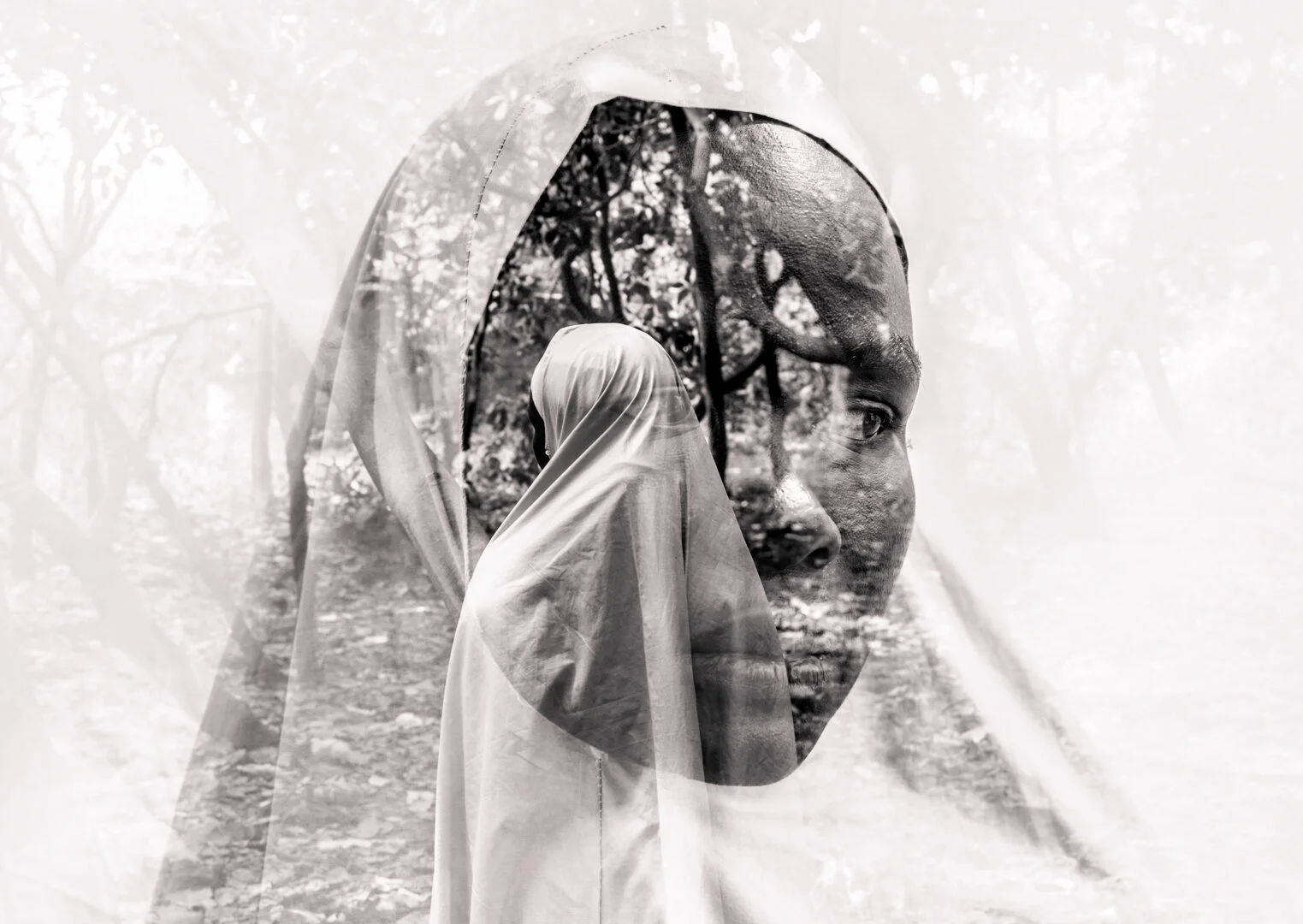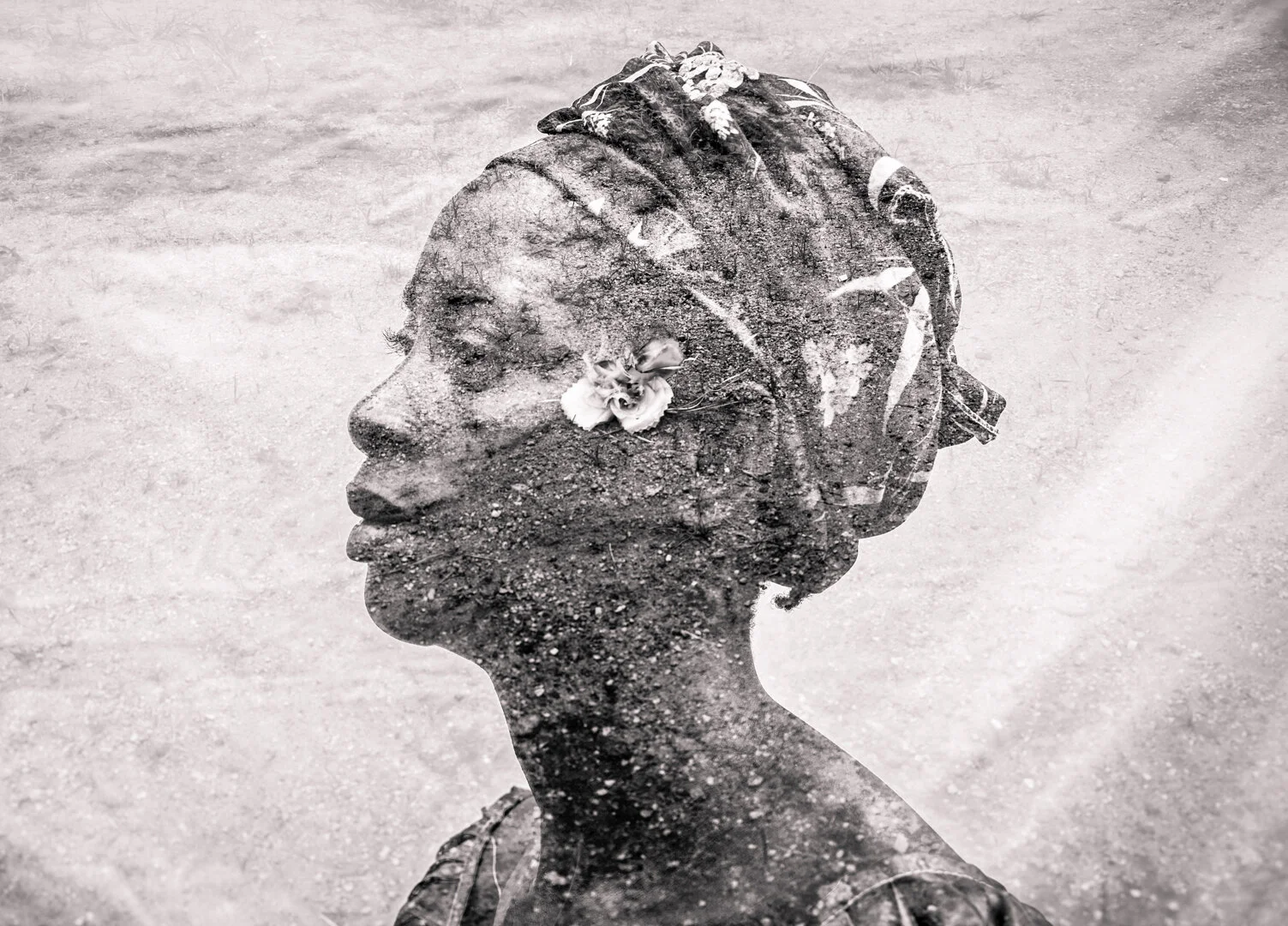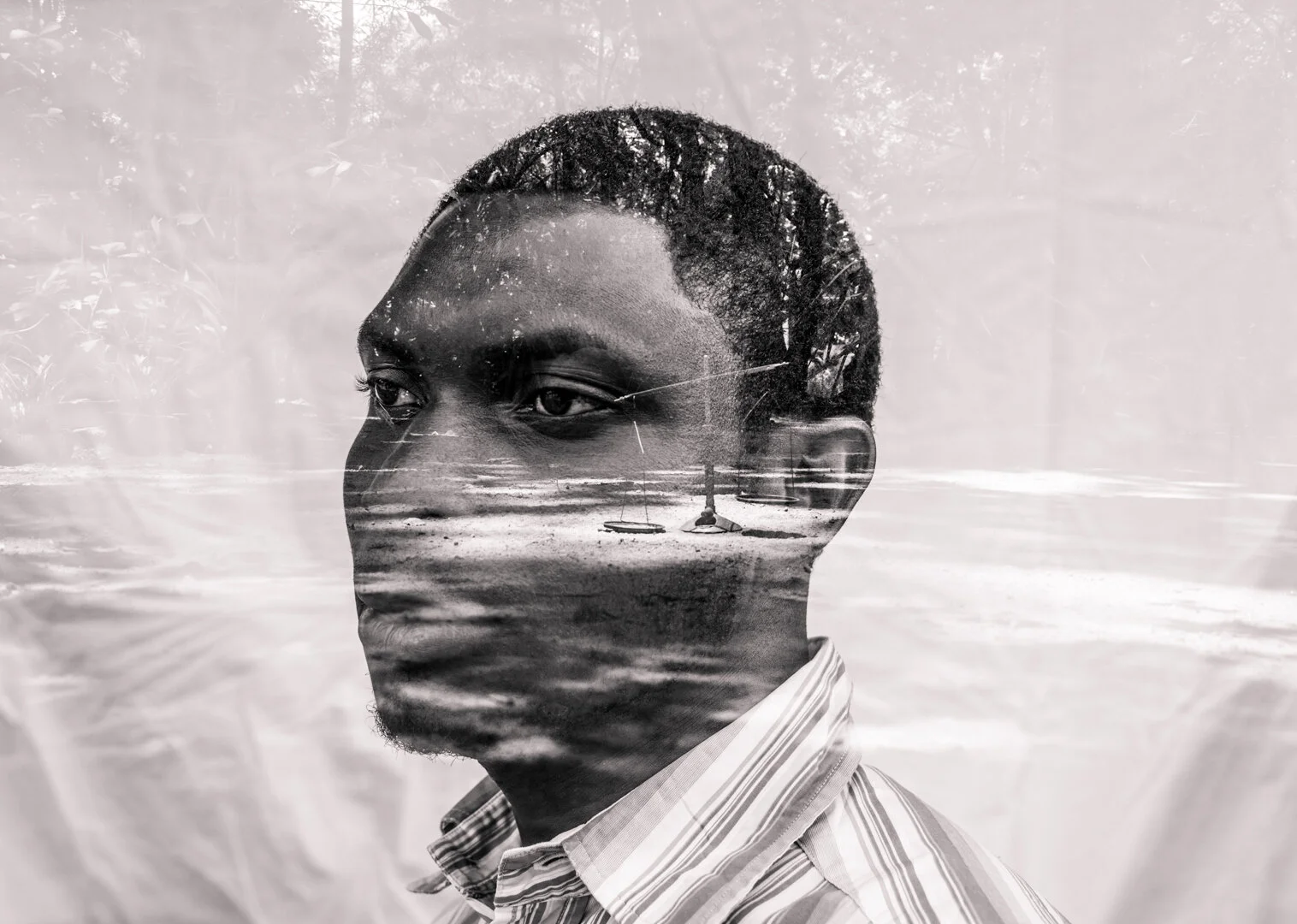
All images courtesy of the artist.
Nigerian photographer Etinosa Yvonne Osayimwen discusses raising awareness of mental health issues faced by survivors of violent conflict
words Shaelyn Stout
As opposition to police brutality and violence grows—from the #BlackLivesMatter movement in the U.S. and UK to the #EndSARS protests currently unfolding in Nigeria—photographer Etinosa Yvonne Osayimwen reminds us to give survivors of terrorism and violent conflict the space to share their stories. A proud Nigerian, Etinosa speaks directly to survivors of violent conflict and raises awareness of the mental health issues they face. Her multimedia series It’s All In My Head provides striking insight into the realities of survivors pre- and post-traumatic conflict by layering portraits with additional images, sound and video. Etinosa is currently covering the #EndSARS protests in Abuja, Nigeria, so we are grateful to have had the opportunity to speak with her about the origins of It’s All In My Head and what she hopes audiences take from it.

“I can barely take care of myself nor my children. I lost everything I had, I’m not happy”. Jim Boton, 35. Lagos, Nigeria.
Shaelyn: Tell us a bit about yourself and your background.
Etinosa: My name is Etinosa Yvonne. I was born and brought up in Nigeria. I didn’t start having an interest in art until 2015. I basically had my studies at university, worked in a semi-corporate space for some time and then became a self-taught photographer.
I didn’t [originally] have [an] interest in photography. I didn’t know anything about it. I didn’t even know if Nigerian people had ever been documentarians, but in 2015, I wanted to start a travel blog. I had a small camera so I could take pictures of the places I was visiting (not as a photographer, just as a tourist) to post with the content I had written. The travel blog never took place, but that was really where my interest [in photography] began. I didn’t process this interest until 2017 when I left my job and said, “let me try photography.” I liked the fact that I could use it as a medium to shed light on issues often underreported.
Your photo series, It’s All In My Head, focuses on Nigerians who have survived terrorism and violent conflict (i.e. ethno-religious violence and communal clashes) as well as the repercussions these experiences have had on their mental health. What motivated you to capture such a heavy topic?
In 2018, I watched the documentary Salam Neighbor (2015) in which there is a Syrian boy who is living as a refugee in Jordan. He didn’t want to go to school but eventually, you find out it’s because he’s been traumatised by the [violence] he witnessed [in Syria].
At the time I was going into IDP (Internally Displaced Persons) camps in Abuja to have chats with people and ask “how can I help you?” I really wanted to see how I could tell stories that would bring attention to their experience. I wasn’t just photographing, I was having genuine, honest conversations with the people as they compared their lives before [entering the camps] to current realities. I mean, these are people that once had everything going for them.
So when I watched [Salam Neighbor], it struck me that people here in Nigeria are going through the same situation learning how to cope with the aftermath [of terrorism and violent conflict] and I wanted to understand the impact this trauma has had on their mental health. That was what motivated me to start this project.
Initially, I was talking to survivors of terrorism, but I soon realised it would be unfair to only speak with those who have experienced terrorism when [Nigeria] is plagued with ethno-religious violence and many other kinds of [conflict]. For this reason, I expanded the scope of the project and worked with both survivors of terrorism and various types of violent conflict.
“Working only with images became increasingly difficult as [the project] centres around emotions and memories, and how do you show things that cannot be seen?”
Growing up in Nigeria, how has your own identity and experience influenced the series?
I grew up in Lagos, which is the commercial centre of Nigeria, and if you grow up in Lagos, you don’t realise the extent of things happening in other parts of Nigeria. You somehow feel disconnected because you only probably watch [what is happening] in the news and you don’t truly understand it.
My upbringing does not necessarily have an influence in the way that I reason now. I think I had to find myself as I grew up. Moving down to the Federal Capital Territory, which is also based [towards] the north, was when I started to see and understand some of these things. When I started to travel on my own and have these conversations, I learned so much about where Nigeria once was and where it is now. I realised I should try to contribute.
I didn’t grow up having much interest in soci[al] issues. Before my teenage years, I didn’t think I would directly affect someone to this extent. It wasn’t until 2015 that I asked myself, “how can I add value to myself and my country as a Nigerian?” By 2017, I left the corporate space and decided to answer that question.
Your portraits are striking individually, but even more so when layered with multimedia in It’s All In My Head. Why did you decide to layer photography, sounds and video in this series and is there deeper meaning behind these stylistic choices?
When I conceived the idea for [It’s All In My Head], I knew I wasn’t going to present these images as plain portraits or in documentary style. The goal was to show people and their state of mind, but how was I going to do that? As I was researching for the project, I found a YouTube video about double exposures and thought this was a fascinating way of putting together a project. Through double exposures, I would be able to draw people into their state of mind, which is why I used layering. Working only with images became increasingly difficult as [the project] centres around emotions and memories, and how do you show things that cannot be seen? [For this reason] I started to incorporate sound and video, which slowly allowed the project to become multimedia.

Deborah Danjuma, 40. Kaduna, Nigeria.

What audience(s) do you hope to reach with this photo series and what do you hope your audience takes away from these themes and your images?
First off, I am really interested in having this work speak to the Nigerian people because there are sharp disparities between people in Nigeria. People who live way down south may not understand or know about the struggles of the north or the west. In Lagos, for example, many people don’t understand the severity of the things that are happening in southern Kaduna, Adamawa, Borno. To be able to bridge that gap and help people understand that this is what is happening, that we need to pay attention to these regions, is vital.
The goal of this project—because [Nigerians do] pay attention to accommodating and aiding [victims of terrorism and violent conflict]—is to raise awareness of the impact these horrible events have had on victims’ mental health. It’s not that society doesn’t want to discuss [terrorism and violent conflict in Nigeria]; millions have joined that conversation. It’s just that some of these people don’t know how to talk about what happened to them, it’s like it happened and they have to just figure it out.
For example, we had a candlelight service in Lagos and Abuja and some other states in Nigeria the other day, and it was just beautiful. It was a way to say we stand in solidarity for our brothers and sisters who have been killed by police unjustly. It was a way to heal the families [affected] and show that we feel their pain. That is the same thing I am trying to do with [It’s All In My Head], to show that these things are happening and give survivors the space to speak up. When conflict happens and you hear “10 people died in communal clashes,” you’re never told their names or whether they had a family; they just become numbers. We need to stop seeing them as numbers and start seeing them as human beings. Say their names, acknowledge their lives, their dreams and aspirations. I want this [violence] to be a Nigerian issue, not a regional one. Yes, it may be happening in the west or the north of Nigeria, but we need to come together and allow [survivors and victims’ families] to share their stories.
I have spoken to someone who saw her husband burned alive. They set him on fire. So yes, my first audience is the Nigerian people but globally I want those who see my project to know that we need to do better for anyone who has experienced traumatic events—not only in Nigeria but across the world. Mental health should be something we see as part of physical health. It should be affordable, accessible and lend itself to a society that allows people to speak up when they are suffering.

“I went through hell and I can’t get it out of my head”. Hajara Abubakar, 24. Borno, Nigeria.
How do you think your work photographing survivors of violent trauma has impacted your own mental health?
This project is very heavy, extremely heavy, because you are taking in a lot of people’s pain. So when I am actively working on [‘It’s All In My Head’] I have to take breaks. I won’t touch the project for one week physically, but mentally it is still there. I even started working on another project last year because I needed something that wasn’t as heavy on my head. It gets so heavy for me and realising that you can’t help all these people really hurts. There are still clashes and violent conflicts in regions of Nigeria since I started [It’s All In My Head], which makes it seem like nothing has changed. I wonder who is talking to these people? Who is helping them? Who is helping their psyche?
I lost myself when I started working on this project, so [I would say if you are going to create work on issues having to do with mental health, you need to also take time to take care of yourself]. Speak to your network or even go to therapy while you are working with heavy topics such as mental health.
“ I saw what it felt like to be Nigerian through the eyes of a millennial. We all want better; we all want [the Nigerian government] to end SARS.”
I know you are currently photographing and participating in the End SARS protests in Nigeria. What has that been like and how do these protests relate to your work in It’s All In My Head?
I have been very interested in the protests because they’re like nothing I’ve ever witnessed since I was born in Nigeria. Unfortunately, the protests ended because government authorities have forcefully stopped protests—protests which were predominately peaceful. But I think for the first time since becoming an adult, I saw what it felt like to be Nigerian through the eyes of a millennial. We all want better; we all want [the Nigerian government] to end SARS. It was very interesting, it was beautiful. There were all ranges of emotions, resilience, frustration, happiness, joy, unity. When I look at some of the images I captured during the protests I feel sad because I miss [the protestors’] courage. It was calming, it was good to see men standing up for women. It was good to see women speaking out and mobilising at the forefront of the protests.
I’d say the aftermath of the protests relates to It’s All In My Head. You know, what is happening to the families of those who have been unjustly killed? How are they coping? I keep thinking about that. There were looters infiltrating the protest, and at the end of it all, no one in the government is held accountable. So not much changes. It makes you feel a bit helpless.

“I fear that the attackers might strike again because no arrest has been made, justice has not been served”. Abdul-Razak Salisv, 27. Kaduna, Nigeria.
What is your hope for Nigeria’s future, especially regarding the mental health of survivors of violent conflict and trauma?
My hope for the future of Nigeria is that we are able to organise constant support groups for survivors of terrorism and violent conflict. It would be great to live in a Nigeria where victims of these traumatic events can walk into a safe space and talk about what happened to them, regardless of gender, class, etc. There are a lot of things I would love to see happen [in Nigeria], but I think we have a long way to go. I’d like to see education for those in rural, hard-to-reach areas so children across the country can understand that [violent conflict] is a real issue but one that can end if we come together.
View Etinosa’s It’s All In My Head series and her other work here.
Anyone seeking mental health support in the UK can contact the Black, African and Asian Therapy Network and/or the Samaritans. Those seeking mental health support in Nigeria can find various therapists’ contact information via Feminist Co.